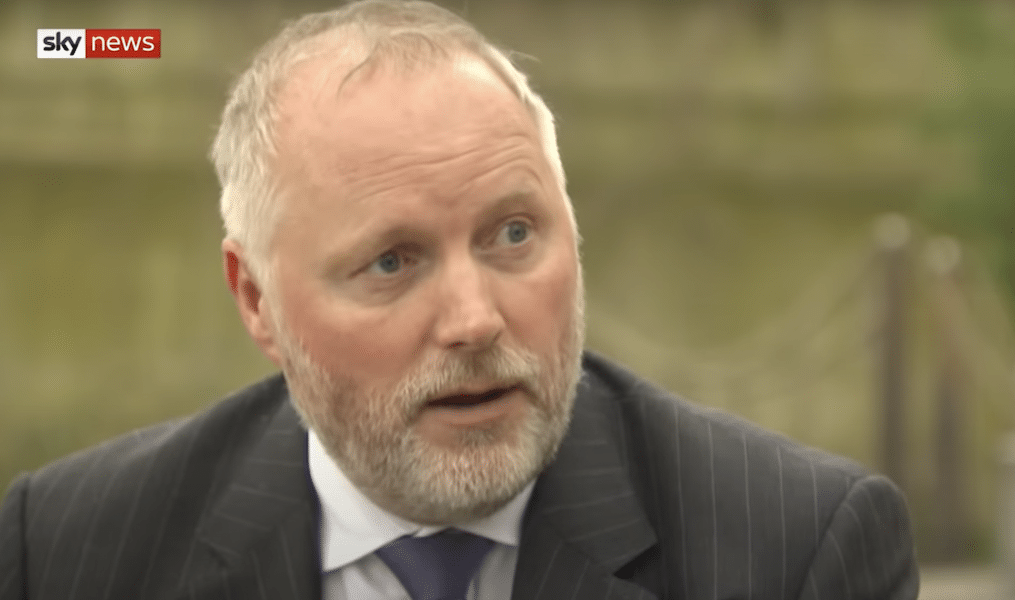Former police officer Harry Miller. (Sky News)
An appeals court has ruled in favour of ex-police officer Harry Miller, declaring that “gender critical” comments should not have been classed as “hate incidents” by police.
The case was brought by Harry Miller, a former police officer from Lincolnshire, who was visited by Humberside Police in January, 2019, in relation to multiple anti-trans tweets after complaints were made.
The so-called gender critical tweets from his account, which was later suspended by Twitter, included one which read: “I was assigned mammal at birth, but my orientation is fish. Don’t mis-species me. F**kers.”
Although Miller was not charged with any crime, his actions were recorded as a non-crime “hate incident”.
In response, Miller launched two-pronged legal action against the College of Policing, arguing against the recording of his comments as a hate incident, and against the guidance itself on non-crime hate incidents from the college.
According to the guidance from the College of Policing, which sets rules for police forces nationwide: “Where it is established that a criminal offence has not taken place, but the victim or any other person perceives that the incident was motivated wholly or partially by hostility, it should be recorded and flagged as a non-crime hate incident.”
In February last year, the High Court ruled that Miller’s tweets were “were lawful and that there was not the slightest risk that he would commit a criminal offence by continuing to tweet”.
Justice Julian Knowles continued at the time: “I find the combination of the police visiting the claimant’s place of work, and their subsequent statements in relation to the possibility of prosecution, were a disproportionate interference with the claimant’s right to freedom of expression because of their potential chilling effect.”
Although his challenge against the College of Policing guidelines on hate incidents was initially rejected by the High Court, on Monday (20 December), the Court of Appeal ruled in Miller’s favour.
The court insisted the guidance had had a “chilling effect” on Miller’s freedom of speech, according to the BBC, despite revisions having since been made to warn officers against “a disproportionate response to reports of a non-crime hate incident”.
Ruling, Dame Victoria Sharp said: “The net for ‘non-crime hate speech’ is an exceptionally wide one which is designed to capture speech which is perceived to be motivated by hostility… regardless of whether there is evidence that the speech is motivated by such hostility.”
She added: “In my opinion [the revisions to the guidance] do not go very far or not nearly far enough to address the chilling effect of perception-based recording more generally.”
Responding to the ruling, Harry Miller insisted offending people was a ‘cornerstone of freedom’
Outside court after the ruling in his favour, Harry Miller told reporters that offending people was “one of the cornerstones of freedom”.
He said: “Being offensive is not, and cannot and should not be an offence.
“Only when speech turns to malicious communication or targeted harassment against an individual should it be a problem.”
The College of Policing’s assistant chief constable Iain Raphael said in a statement: “The balance we have always aimed to strike is between the need to protect vulnerable people and communities from harm with the need to facilitate and protect freedom of speech.
“The court has found we need to make safeguards in our guidance more explicit to help police officers proportionately enforce the law.
“We will listen to, reflect on, and review this judgement carefully and make any changes that are necessary.”
Since initially launching legal action, Miller founded the anti-trans pressure group Fair Cop, which claims it represents those “contacted by the police for expressing criticism of transgender activism”.
The group has expressed its support for individuals like disgraced comedian Graham Linehan, who compared gender-affirming healthcare to Nazis experimenting on children in concentration camps during the Holocaust, and Kellie-Jay Keen-Minshull, who chose to appear on the YouTube channel of a white nationalist who has strong ties to neo-Nazis and white supremacists.
